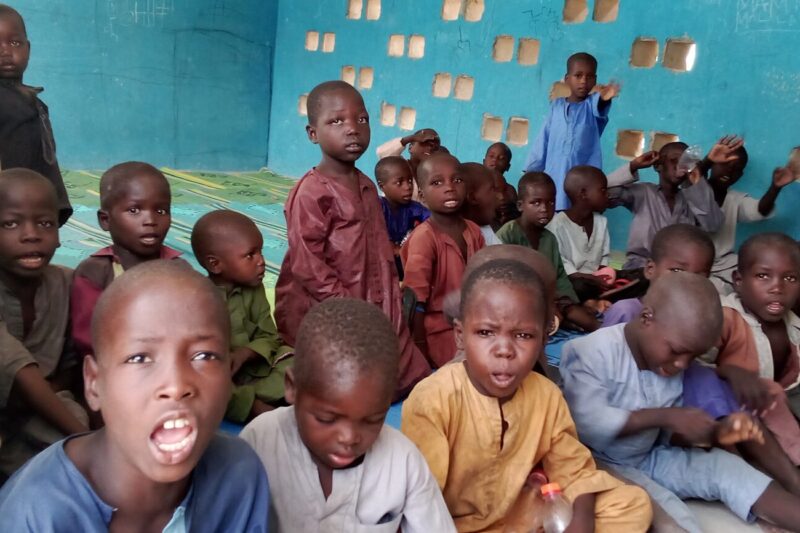Borno State government, in collaboration with the World Health Organisation, hold six-day anti-polio campaign in all 27 local government districts in a concerted effort to keep the state polio-free.
To encourage children to get immunised, the Borno State government, in collaboration with the World Health Organisation (WHO), handed out packets of instant Indomie noodles to those who agreed to get the injection and oral medication during a six-day anti-polio campaign.
Each child who was immunised had their fingers stained with ink.
But the incentive backfired in some cases when a few of the older kids, most of whom were starving, scratched off the ink and went back for a second round of vaccinations just so that they could get more noodles.
It took those who were implementing the immunisation campaign a while to catch on. When they did, they made the ink markings darker and bigger so that they would last longer and could not be scratched off so easily.
The campaign took place from October 1 to October 6.
The aim of the campaign was to target more than 2.5 million children – from newborns to five-year-olds – throughout all 27 local government districts, even in remote areas, in Borno State to ensure transmission of the polio virus would be halted.
Baba Kaumi Mele, a vaccine administrator at the Sulumri community in Maiduguri, told RNI that the polio vaccine administered this year included oral medication as well as an injection, both of which were given to each child at the same time.
“Because the children were each given a packet of noodles after being vaccinated, it tempted some kids to go back for a second round of vaccinations even though their fingers had been marked with ink the first time. But some of the kids were wily enough to scratch off the ink. When we realised this was happening, we ensured that more ink was used so that it would take longer to fade and disappear from their fingers. And it could not be scratched off so easily.
“The ink markings helped us to know if the children had already been immunised.”
Ahmad Sadiq, a vaccine administrator at the Gwange community, said: “Many children missed getting immunised when they were newborns so that was our target – from newborns to children of five years. The babies who had not been immunised before were given the number of doses they missed before being given them the polio vaccine.”
Mohammed Alhaji, the executive director of the State Primary Healthcare Development Agency, told RNI that there had not been a single case of polio for 13 months in the state.
“This campaign will enable us to maintain and sustain Borno State’s polio-free status.”
Baba Kolo Waziri, an immunisation officer at the maternal and child health clinic in Maiduguri, said: “Our field staff were warned about children coming back for seconds just to get more noodles so they were keeping an eye out for such kids. If children were able to get a double dose of the vaccine it might have resulted in the child getting a fever or fainting.
“It was for this reason that I called on parents to keep a check on their children. It was also why we took care to ensure the ink stain could not be scratched off so easily. We did have a few cases in Maiduguri of children coming back for seconds. But once the ink was darker and hard to scratch off, they could not deceive us.”
Fatima Chiroma, from the Sulumri community in Maiduguri, said: “Two of my children – a three-year-old and an eight-month-old baby – were immunised. We received the noodles afterwards. I was concerned when I heard that children of four or five were scratching off the ink without their parents’ knowledge. All they wanted was more noodles because they are so hungry. I heard that some older children pretended to be five years old just so that they would get noodles.
“I warned my older children not to try to get the vaccine just to get the noodles and told them there would be consequences if they did so and they could get ill. I hope other parents also took this matter seriously.
“I think the relevant authorities need to look into this matter and provide a better solution. The problem is that if they had not given out free noodles, many parents might not have bothered to get their children vaccinated even though it is imperative for them to ensure their children are immunised. The authorities need to come up with a workable solution.”
Doctor Moisule Hussaini Ganga, the WHO’s acting director for Borno State, said at the launch of the campaign: “The WHO will continue to support the state government in immunising eligible children, even those who live in hard-to-reach locations. We are confident this campaign will be successful in eradicating the wild polio virus for good.”
FALMATA MOHAMMED ALI








